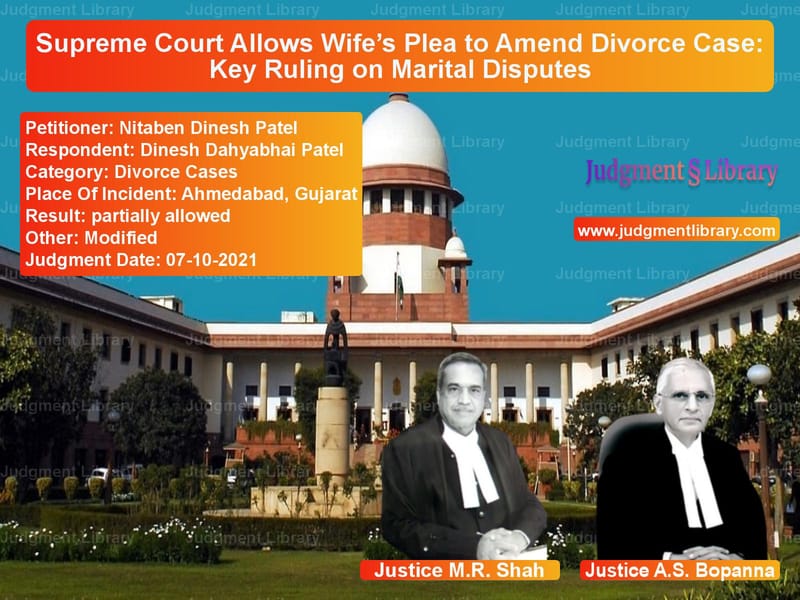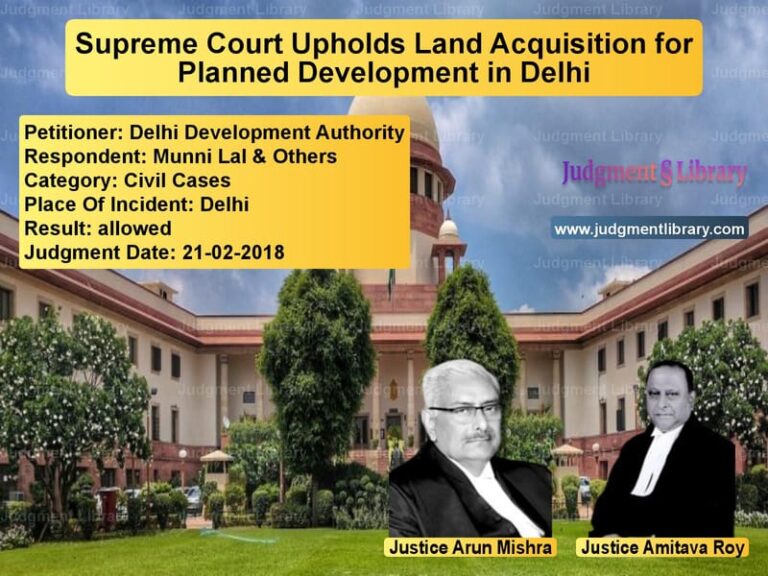Supreme Court Allows Wife’s Plea to Amend Divorce Case: Key Ruling on Marital Disputes
The Supreme Court of India, in the case of Nitaben Dinesh Patel v. Dinesh Dahyabhai Patel, addressed a significant issue concerning amendments in divorce proceedings. This case, Civil Appeal Nos. 5901-5902 of 2021, arose from an appeal challenging the Gujarat High Court’s order that refused to allow the wife to amend her written statement in a divorce case. The Supreme Court, in its judgment dated October 7, 2021, delivered by M.R. Shah and A.S. Bopanna, ruled in favor of the wife, allowing the amendment to bring crucial facts about the husband’s second marriage onto the record.
Background of the Case
The dispute originated from a petition filed by the respondent-husband, Dinesh Dahyabhai Patel, under Section 13 of the Hindu Marriage Act, 1956, seeking dissolution of his marriage with the appellant-wife, Nitaben Dinesh Patel, on grounds of cruelty. The couple had been married since March 1, 1987, and had a son named Devashya, born in 1990.
The wife opposed the divorce, stating that the husband had abandoned her and their son on February 9, 2006, and had refused to provide them maintenance. During the course of the trial, the wife discovered that the husband had allegedly remarried a woman named Hinaben Manubhai Panchal on December 14, 2006, without first obtaining a divorce from her.
Read also: https://judgmentlibrary.com/divorce-case-transfer-supreme-court-allows-wifes-plea-for-convenience/
She then moved an application under Order VI Rule 17 of the Civil Procedure Code (CPC), seeking to amend her written statement by adding crucial details about the alleged second marriage and requesting a declaration that the second marriage was illegal and void. The Family Court allowed part of the amendment but rejected her request to introduce a counter-claim regarding the second marriage. The Gujarat High Court, on appeal, overturned the Family Court’s order and dismissed the amendment application entirely, leading to the present appeal before the Supreme Court.
Key Legal Issues Before the Court
- Whether the wife could be permitted to amend her written statement to include allegations about the husband’s second marriage?
- Whether the Family Court was right in rejecting the wife’s request to declare the husband’s second marriage void?
- Whether the High Court erred in setting aside the Family Court’s order allowing partial amendment?
Petitioner’s Arguments
The appellant-wife, Nitaben Dinesh Patel, contended that:
- The husband had remarried without first obtaining a divorce from her, making his second marriage illegal.
- She only became aware of the second marriage during the husband’s cross-examination, when he admitted to it and produced a marriage certificate.
- The Family Court had correctly allowed her to amend her written statement to include these facts under Order VI Rule 17 CPC.
- The amendment was necessary to establish that the husband was guilty of adultery and had concealed material facts.
- The High Court’s decision to reject the amendment entirely was unjustified and deprived her of a fair opportunity to present her case.
Respondent’s Arguments
The respondent-husband, Dinesh Dahyabhai Patel, countered that:
- The wife had known about his second marriage since 2007 and had deliberately delayed raising the issue to prolong the litigation.
- Allowing the amendment at a late stage would unfairly prejudice him.
- The amendment sought to introduce a counter-claim under Section 23A of the Hindu Marriage Act, which was not permissible for declaring a third-party marriage void.
- The relief of declaring his marriage void was not within the scope of divorce proceedings and should be sought separately under the Special Relief Act, 1963.
Supreme Court’s Judgment
The Supreme Court ruled that the amendment was justified and should be allowed in part. The key findings of the Court were:
- The wife had acted diligently and sought the amendment as soon as she obtained documentary proof of the second marriage.
- The amendment was crucial to proving that the husband had been living in adultery, which was a relevant fact in divorce proceedings.
- The proviso to Order VI Rule 17 CPC did not apply in this case, as the amendment was necessary for determining the real issues in controversy.
- However, the wife could not seek a declaration regarding the validity of the husband’s second marriage in the divorce proceedings.
- If she wished to challenge the validity of the second marriage, she would need to file a separate suit under the Special Relief Act.
Key Extract from the Judgment
“On a fair reading of Section 23A of the Hindu Marriage Act, we are afraid that the relief sought by way of counter-claim in the Hindu Marriage Petition filed by the respondent-husband can be claimed. No relief can be prayed qua the third party. Therefore, the only remedy available to the appellant would be to file a substantive suit.”
Final Verdict
- The Supreme Court partly allowed the appeal, restoring the Family Court’s order allowing the wife to amend her written statement.
- The Court dismissed the wife’s request to declare the husband’s second marriage void within the divorce proceedings.
- The Court clarified that the wife was free to file a separate suit challenging the validity of the husband’s second marriage.
Impact of the Judgment
This ruling has significant implications for divorce cases involving allegations of adultery and second marriages. The judgment:
- Allows spouses to amend pleadings if they discover material facts during the trial.
- Clarifies that claims against third parties (such as a second spouse) cannot be raised in divorce proceedings.
- Reaffirms that amendments under Order VI Rule 17 CPC should be permitted if they help resolve the dispute fairly.
- Provides clear guidance on when a separate suit must be filed to declare a marriage void.
This case is an important precedent for spouses seeking to introduce newly discovered facts in ongoing divorce proceedings while maintaining procedural fairness.
Petitioner Name: Nitaben Dinesh Patel.Respondent Name: Dinesh Dahyabhai Patel.Judgment By: Justice M.R. Shah, Justice A.S. Bopanna.Place Of Incident: Ahmedabad, Gujarat.Judgment Date: 07-10-2021.
Don’t miss out on the full details! Download the complete judgment in PDF format below and gain valuable insights instantly!
Download Judgment: nitaben-dinesh-patel-vs-dinesh-dahyabhai-pat-supreme-court-of-india-judgment-dated-07-10-2021.pdf
Directly Download Judgment: Directly download this Judgment
See all petitions in Alimony and Maintenance
See all petitions in Mutual Consent Divorce
See all petitions in Property Division in Divorce Cases
See all petitions in Judgment by Mukeshkumar Rasikbhai Shah
See all petitions in Judgment by A. S. Bopanna
See all petitions in partially allowed
See all petitions in Modified
See all petitions in supreme court of India judgments October 2021
See all petitions in 2021 judgments
See all posts in Divorce Cases Category
See all allowed petitions in Divorce Cases Category
See all Dismissed petitions in Divorce Cases Category
See all partially allowed petitions in Divorce Cases Category







